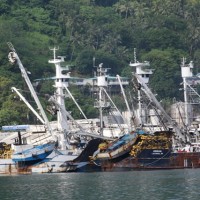
Fourteen Pacific Island nations will receive over $100 (M) million to protect their tuna-dependent economies from climate change impacts on tuna. KHJ News Washington DC correspondent Matt Kaye reports…
The nations, party to the South Pacific Tuna Treaty will receive $107 (M) million to adapt their fishing economies as climate change pushes fish farther from their shores.
The UN-created Green Climate Fund in a story first reported by the Washington Post will pay for an advanced warning system to track changes in tuna migration.
It will also possibly pursue compensation when warming waters drive fish from countries’ exclusive economic zones.
The island nations, plus the US and Australia, are all party to the South Pacific Tuna Treaty that allows US purse-seine vessels to fish in the exclusive economic zones of the treaty islands.
Congresswoman Uifa’atali Amata won House passage last year of a bill the Senate must still ok, to allow NOAA to implement 2016 treaty improvements.
Play Audio
(Transc.) Amata: “These changes are important to support the American fishing fleet in the South Pacific –where many boats call the port in American Samoa home. These changes improve the operation conditions and flexibility for the fleet – which is America’s last true distant water fishing fleet.”
The amended treaty defines the number of fishing days in waters exclusively available to US fishing vessels and a system for U.S. vessels to arrange for additional access directly with treaty nations.
The Green Climate grant also includes funding to boost tuna consumption in Pacific Island nations and expand the use of fish aggregation devices, which float offshore to help attract tuna.
Grant recipients are the source of some one-third of the world’s tuna catch.
Without the new money, research found tuna caught in ten island nations could plummet by one-fifth by 2050, for a $90 (M) million a year loss in license revenue.




